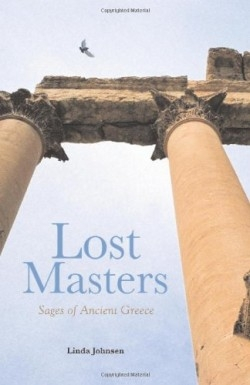Lost Masters
Sages of Ancient Greece
“East is East, and West is West, and never the twain shall meet,”” said Kipling. A poetic sentiment, to be sure, but one that has misleading implications when tracing the derivation of Western philosophic doctrine. From Plutarch to Plotinus, were the venerated sages of antiquity original thinkers, or did they borrow precepts and principles from both Indian and Egyptian cultures?
The author is a contributing editor to Yoga + Joyful Living magazine and has written numerous books on Eastern philosophy and spirituality, including the recent Daughters of the Goddess: The Women Saints of India. She is a self-proclaimed “child of the ’60s,” whose natural inclination was to explore the mystic religious teachings of Krishna and Buddha instead of Socrates and Plato. The sages of ancient Greece held no allure, that is, until her educational and professional research led her to a startling discovery: there was a sinuous thread that could connect Indian theories of enlightenment to Egyptian beliefs of spirituality, and Egyptian dogma to Greek doctrines of philosophy.
Though her findings are presented without academic annotation, Johnsen’s exuberance for her subject is genuine. “I went back,” she says, “to the original Greek historians … in an effort to learn what the ancients said about their own tradition before modern scholars reinterpreted it for them. I was continually amazed at how similar the long-lost Greek world was to the India I travel through today.”
While one might hesitate to call Herodotus, Diogenes, or Empedocles “gurus,” Johnsen points to various ways in which such cerebral philosophers were also insightful masters of spirituality; as concerned with concepts of karma, transcendence, and reincarnation as any yogi. Yoga students can read the works of Plotinus today, she maintains, and immediately recognize the levels of meditative awareness as outlined in the Yoga Sutras from 200 BCE; or contemplate Pythagoras’s “music of the spheres,” sounds, he explained, that humans have been “immersed in … from birth and no longer notice,” which Johnsen links to the “inner sounds yogis associate with the seven planets externally and the seven chakras centers of consciousness in the subtle body) internally.”
From vegetarianism to communal responsibility, Greco-Roman sages followed a purposeful quest for metaphysical understanding so profoundly similar to that of yogis in India, Persia, Babylon, and Egypt that the correlations cannot be overlooked. East may be East and West may be West, but they do share a common spiritual tradition. “When we look to these great men and women, we discover that the gulf between East and West is not nearly as wide as we had imagined,” says Johnsen. It seems the twain can meet after all. .
Disclosure: This article is not an endorsement, but a review. The publisher of this book provided free copies of the book to have their book reviewed by a professional reviewer. No fee was paid by the publisher for this review. Foreword Reviews only recommends books that we love. Foreword Magazine, Inc. is disclosing this in accordance with the Federal Trade Commission’s 16 CFR, Part 255.

